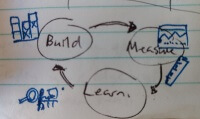These recollections are based on my personal notes, mistakes are my mine. My comments added in [square brackets]. I also added the headings for narrative structure.
'Keep going'
A govt. that delivers policy and services needs to be focused on users needs
Users first
Users first, is this important. Often align things to internal processes, Ministers, and Secretaries.
Multidisciplinary teams with specialists
Ben leads a design team, service design [instead of BAs], user research, interaction design, content design, and front end developers
He recommends hiring specialists so they can do things well
Understanding user needs as part of the full end to end service experienced by the end user. Including back end tech and processes
#govdesign is a good idea
culture of how we work - collaboration and design
focus in being drawn from digital to other things
Find the sweet spot combining people, policy, and delivery

More on this topic for the overachievers -Christian Bagon - (the frontiers of design for policy)
Ben used the flight deck metaphor with reference to Google Maps to explain how leaders and managers often plan from far away and need to into Google Street View level.
[This telescoping between high level strategic to operational and/or UI detail is a very important ability to have in your design team.]
User Experience is what happen in peoples lives
UX is not a transaction, its the outcome
What happens in peoples lives (is the policy)
Everything starts with a people problem, not a technology problem
To a user, a service is simple. It's something that helps them do something
Consider not just functional needs, also emotional. Getting a job is practical, the fear of getting sick and losing your job is emotional.
Everything is complex and that is okay. The job is to stay focused on simple outcomes.
Equality isn't about making things work exactly the same for everyone. It's about having the flexibility to get everyone the same outcome.
Introduce small collective outcomes
Shape the culture
First need to shape culture, a lot of this is keep going, turn up every day, call out things.
Things we need to succeed
- empathy
- clarity
- creativity
Designers can deliver these through teams
Recommended a couple of books:
Think like an artist - Will Gompertz
How to fly a horse - Kevin Ashton
Ideas need honing, simplifying, and focusing
Get started with small actions
You can start small because you are small (and that's okay)
Be deliberate with your language
It's user research not user testing - leisa reichfelt - user research blog.gov.uk
Adjust the focus
If we're not communicating well with each other, it's unlikely we can communicate well with other stakeholders
"Successful automation - and digital transformation - is about freeing people up to tackle the problems they don't normally get time to solve."
Source: Paul Taylor (Bromford Labs)
Take small risks everyday.
"The greatest enemy of success is the attempt to fortify against failure"
Source: Ed Catmull (co-founder Pixar)
Fortifying against failure can create local maximums which you can't progress past
Prioritise the ritual of doing
Experiment more
Shorten the feedback loop
Build and test lots of things
Prototyping <> User Research > Backlog > Active release date
Build > Measure > Learn

Design at its best frames the unusual and accelerates diversity. It's mistakes make it human.
A big idea is better than having a big plan
What's your campfire, or what draws your organisation together.
...move from 'everyone wants to solve the problem' to 'everyone wants the problem to be solved'
Team - move away from solving problems on their own to collaboration.
move from disliking problems to enjoying problems
Have fun :-)
The more seriously we take things, the more rigid and unimaginative our work becomes
Work in the open, and find your edge
Finding your edge gives your focus. It makes everything more real.
You earn the extreme moments of optimism from the daily struggles we all fight our way through."
Source: Bruce Springsteen
.66% of GovUK is designers. They use behavioural science and quant. data to shape up front thinking.
Good principles for design teams
Start small, think big. Take responsibility and own the problem